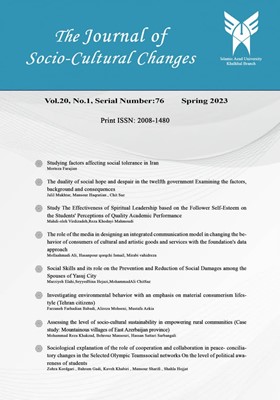Explaining The Role Of Utilizing Educational Escape Room Games In Developing Social And Cultural Life Skills (Case Study: Elementary School Curriculum)
Subject Areas : FamilyLeyla Mehranian 1 , Farideh Goudarzi 2 *
1 - Department of Educational Sciences, Malayer Branch, Islamic Azad University, Malayer, Iran.
2 - Department of Educational Sciences, Malayer Branch, Islamic Azad University, Malayer, Iran
Keywords: Educational, Life Skills Development, Social, Cultural, Elementary, Curriculum.,
Abstract :
This study was designed and conducted to explain the role of utilizing educational escape room games in the development of social and cultural life skills among elementary school students. The main objective was to examine the effect of using this interactive and engaging game within the life skills curriculum on enhancing skills such as self-awareness, communication skills, creative thinking, decision-making, participation and collaboration, as well as the overall improvement of students' life skills. The research employed a quasi-experimental design with a pretest-posttest and control group to accurately assess the effects of the escape room game. The statistical population included 2,320 elementary students in Malayer, from which 40 students were selected by stratified random sampling; 20 students were assigned to the experimental group and 20 to the control group. Data were collected through a 40-item life skills questionnaire developed by Saatchi et al. (2009). Data analysis was performed using covariance analysis, independent t-tests, and Bonferroni tests, with SPSS software conducting the statistical analysis. The results demonstrated that the educational escape room game had a significant impact (P<0.001) on all examined components, leading to an improvement in life skills in the experimental group. These findings emphasize that using escape room games, by providing an interactive, dynamic, and practical environment, can facilitate life skills learning and establish itself as a novel and effective method in the elementary curriculum.
سلیمی، امیررضا. (1399). مدارس اجتماعی؛ راهکاری کالبدی برای افزایش تعاملات اجتماعی در بستر محله. فصلنامۀ علمیتخصصی-معماریشناسی، دورۀ 3، شمارۀ 15، 5-1.
شریفیاردانی، علیرضا. خرمائی، فرهاد. (1401). رابطۀ سرمایۀ اجتماعی و فرهنگی والدین با مهارتهای اجتماعی فرزندان: نقش واسطهای سبکهای والدین دربرخوردبا هیجانات منفی کودکان. فصلنامۀ علمیپژوهشی-پژوهشهای روانشناسی اجتماعی، دورۀ 12، شمارۀ 45، 142-121.
قدرتی، زهراسادات. درویش، بهروز. بلانیان، ندا. (1402). بررسی شاخصهای تأثیرگذار بر طراحی دبستان و مرکز خلاقیت کودکان باتأکیدبر ارتقاء خلاقیت محیطی و افزایش مهارتهای اجتماعی در کودکان. فصلنامۀ علمیپژوهشی-معماری و شهرسازی آرمانشهر، دورۀ 16، شمارۀ 43، 194-177.
قدرتی، زیبا. قدرتی، سیما. (1396). اثربخشی آموزش مهارتهای زندگی از طریق بازی بر مشکلات رفتاری دانشآموزان. فصلنامۀ علمیپژوهشی-فرهنگ مشاوره و رواندرمانی، دورۀ 8، شمارۀ 33، 178-161.
Jiaopin, Ren. Xu, Wei. Liu, Ziqing. (2019). The Impact Of Educational Games On Learning Outcomes: Evidence From A Meta-Analysis. International Journal Of Game-Based Learning, 14(1): 1-25.
Karol, Elizabeth. Smith, Dianne. (2018). Impact Of Design On Emotional, Psychological, Or Social Well-Being For People With Cognitive Impairment. HERD Health Environments Research & Design Journal, 12(3): 220-232.
Makri, Agoritsa. Vlachopoulos, Dimitrios. Martina, Richard A. (2021). Digital Escape Rooms As Innovative Pedagogical Tools In Education: A Systematic Literature Review. Journal Of Sustainability, 13(8): 1-29.
Marilyn, Fleer. Veresov, Nikolai. Walker, Sue. (2017). Re-Conceptualizing Executive Functions As Social Activity In Children's Playworlds. Learning. Journal Of Culture And Social Interaction, 14(1): 1-11.
Walls, Jill K. (2018). To What Extent Do Parents Of Montessori-Educated Children “Do Montessori” At Home? Preliminary Findings And Future Directions. Journal Of Montessori Research, 4(1): 14-24.

